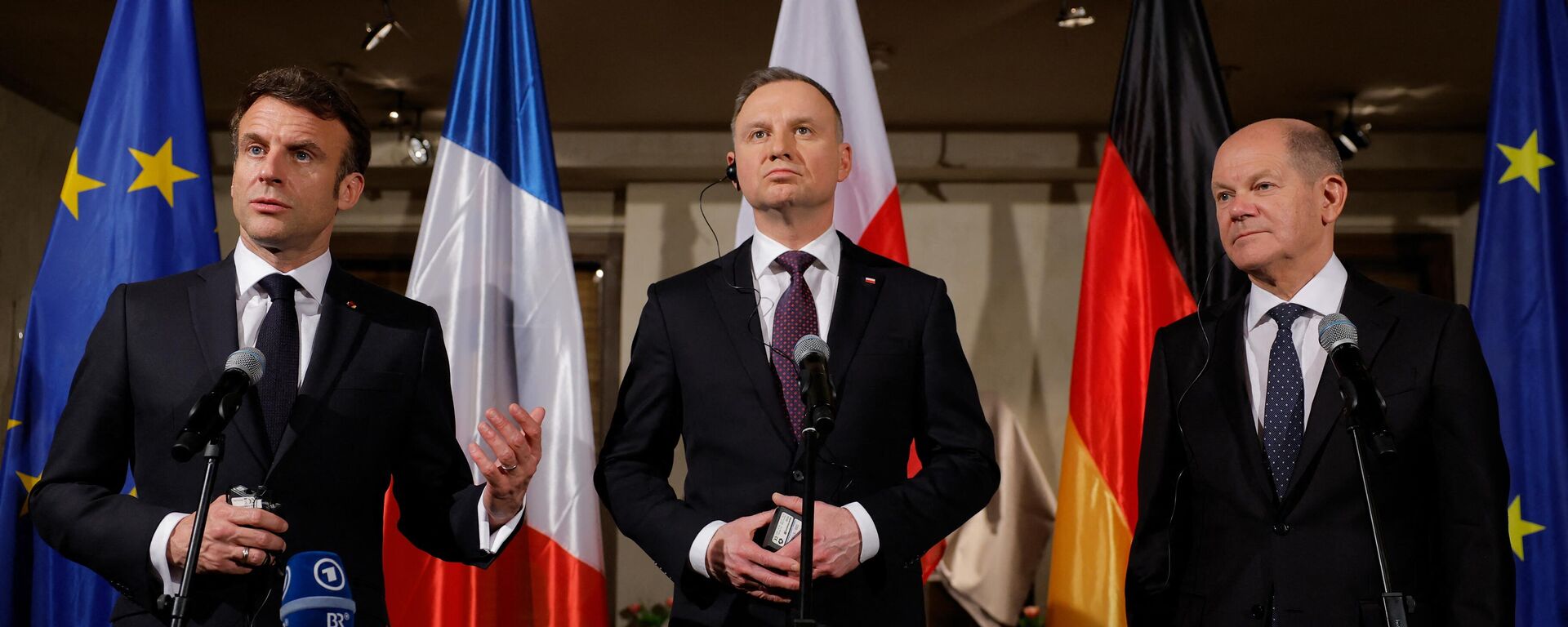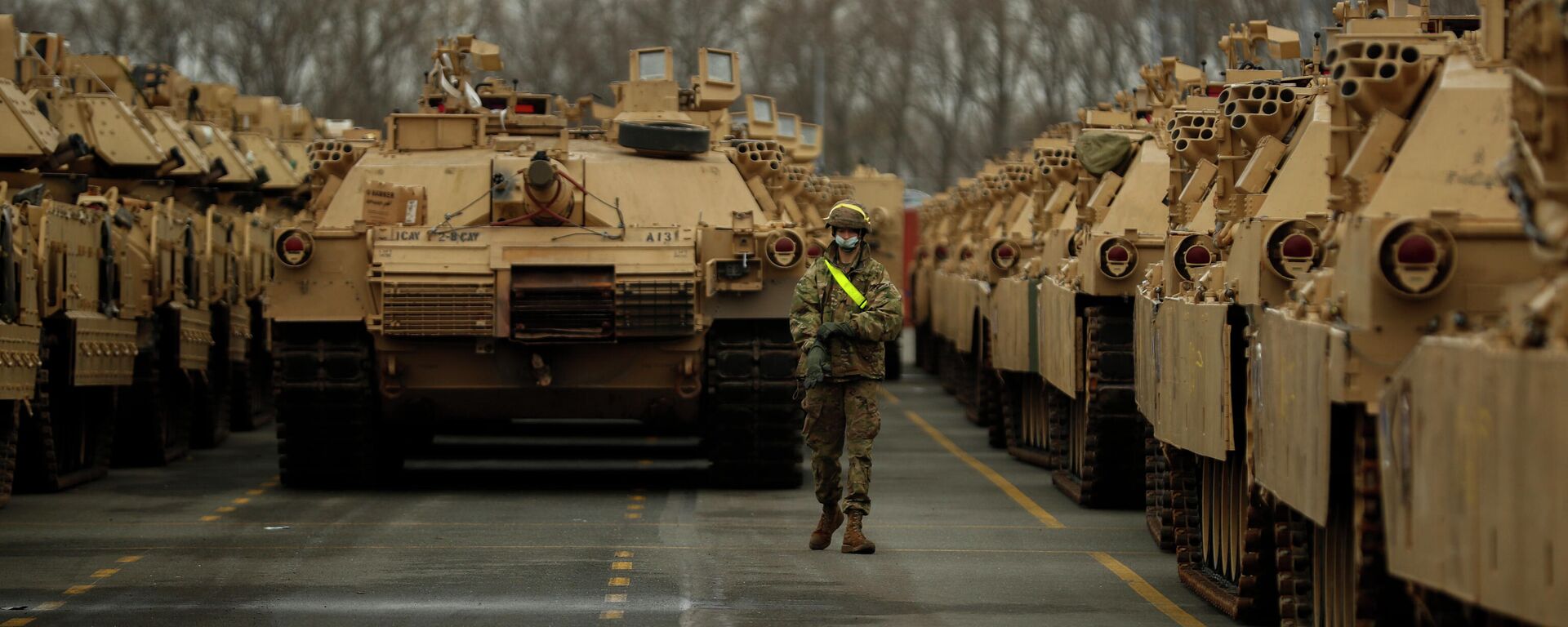2024 Munich Security Index: Most G7 Nations No Longer See Russia as Top Threat
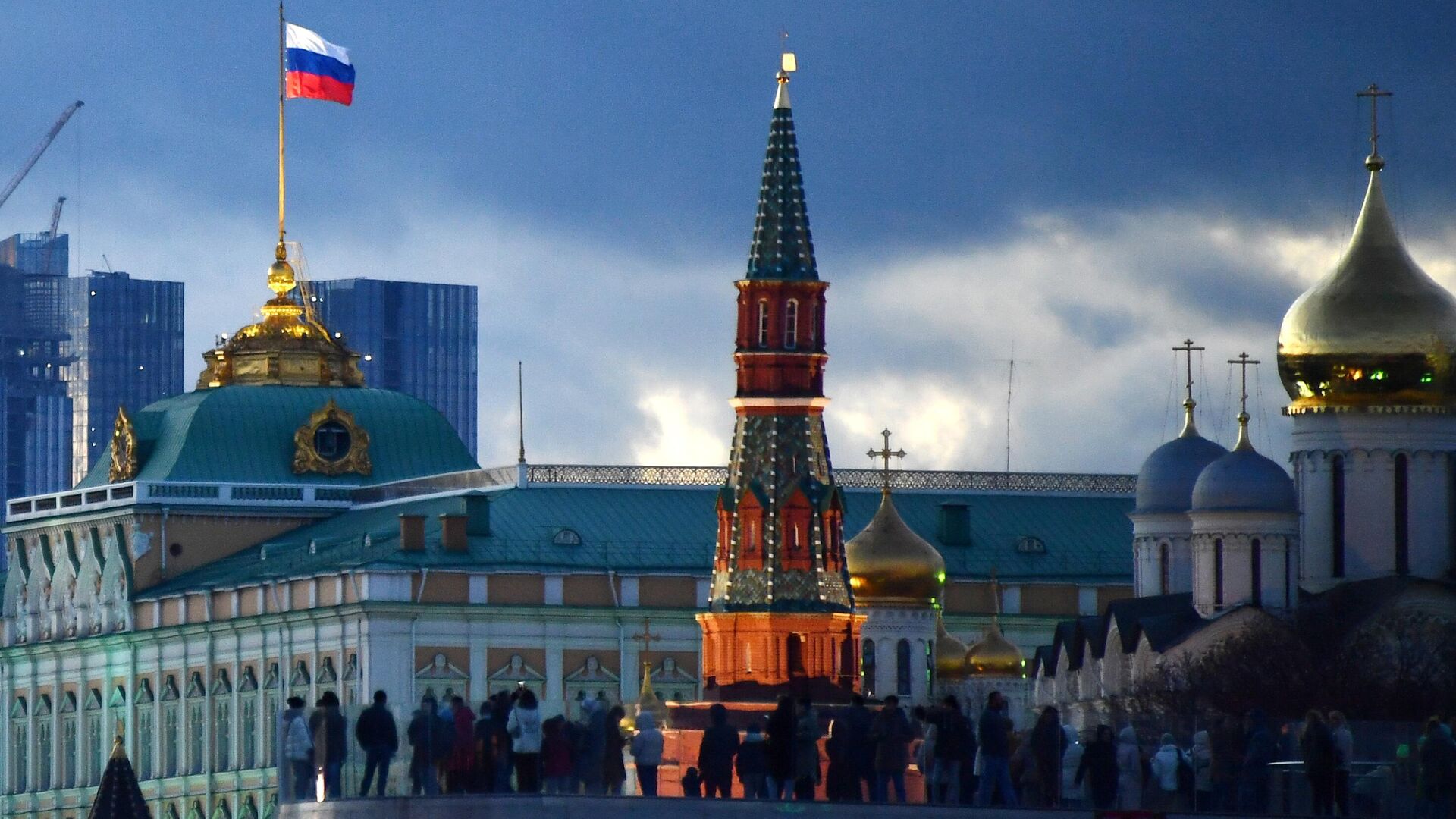
© Sputnik / Evgeny Biyatov
/ Subscribe
The index has indicated that the perception of Russia as a "major risk" has decreased significantly compared to last year's study.
The Munich Security Index (MSI) is a dataset on global risk perceptions among the so-called Group of Seven – a forum of industrialized nations consisting of Canada, France, Germany, Italy, Japan, the UK and the US – and BRICS – the five initial members of the group of major developing nations (Brazil, Russia, India, China and South Africa), which expanded to ten in January 2024.
The survey has been conducted annually since 2021 ahead of the Munich Security Conference (MSC) alongside the Kekst CNC, a global strategic communications consultancy. Since 2023, Ukraine has been included in the MSI instead of Russia.
Based on a poll conducted among 12,000 people globally, the MSI is designed to show how G7 and BRICS view 31 major global and domestic risks by combining five metrics:
Overall risk;
Potential damage;
Expected trajectory;
Perceived imminence;
Feelings of preparedness.
Munich Security Index 2021
The 2021 MSI, conducted in February and March, showed that slightly over half of respondents in all countries surveyed saw Russia as a "major risk". Still, it was markedly less than those who named China (64%) a high threat.
Russia was ranked 24th in the survey's "risk bump chart". The world's top five perceived risks included: the coronavirus pandemic; extreme weather and forest fires; destruction of natural habitats; climate change generally; and a future pandemic.
According to the survey, anti-Russia perception was strongest in the US (63%) and the UK (61%). On the other hand, Italy (46%) and China (41%) were the only countries whose perception of Russia as a "major risk" scored below the global average.
Thirty-four percent of respondents overall expected that the risk from Russia "would increase" over the next year, while around 50% of Chinese respondents said that the risk from Russia would remain stable; 29% said it would decrease; just 20% said it would increase.
The security index indicated a serious gap in the perception of Russia between G7 nations and BRICS with the latter characterizing the country in a more favorable light.
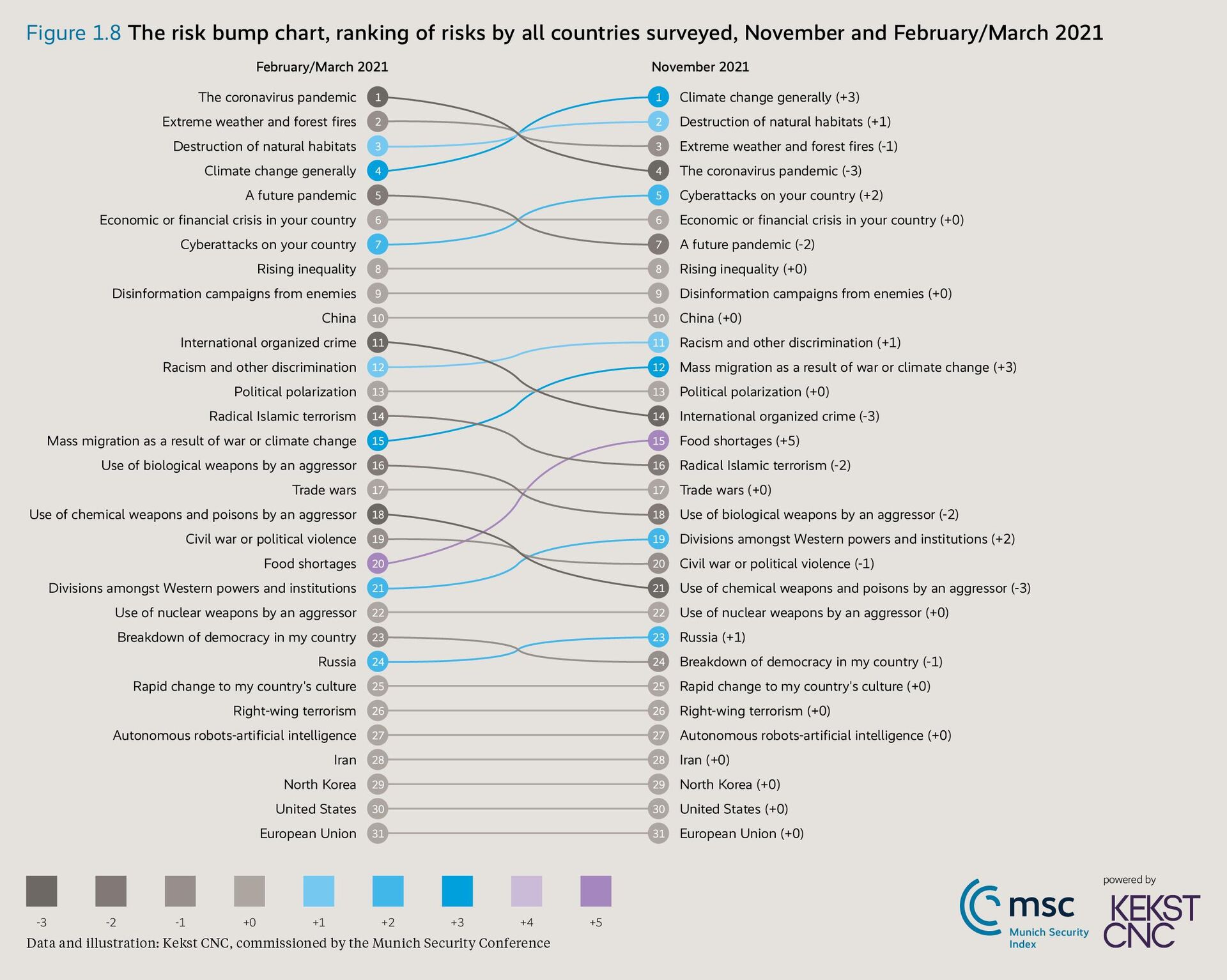
The risk bump chart, ranking of risks by all countries surveyed. 2021
© Photo : MSI
Munich Security Index 2022
The second edition of the index was based on surveys conducted in November 2021.
Russia moved up from 24th place to 23d in the risk bump chart, with the top five major risks being named at the time as: climate change generally; destruction of natural habitats; extreme weather and forest fires; the coronavirus pandemic; cyberattacks on your country.
According to the 2022 MSI, the people polled became "more risk-aware" than in March/February 2021: "This increased awareness pertains, among other things, to the perceived risk posed by mass migration, food shortages, climate change, extreme weather events, rising inequality, and cyberattacks. But it is also evident in risk perceptions toward other countries – China and Russia chief among them."
Remarkably, anti-Russia and anti-China sentiment described by the 2022 MSI coincided with the shift in focus of the Biden administration to the "great power competition." In the US Interim National Security Strategic Guidance released by Team Biden in March 2021, "a destabilizing Russia" and "an increasingly assertive China" were declared as major "strategic challenges" to the US and the world in general.
In March 2021, a new Military Strategy was adopted in Ukraine, too, being almost entirely dedicated to confrontation with Russia and setting the goal of involving foreign states in a possible conflict with Moscow.
Likewise, the US mainstream media had fanned the idea of Russia's "invasion" of Ukraine through the second half of 2021, totally overlooking Moscow's draft security agreements on common European security, non-expansion of NATO, as well as Ukraine's non-aligned status and de-militarization amid Kiev's defiance of the Minsk agreements.
The US/NATO decision to snub Russia's draft security accords left Moscow with little if any choice: Russia was forced to prevent the Kiev regime from continuing to indiscriminately shell Donbass and to ensure that NATO military installations wouldn't be placed on Russia's doorstep.
"After the US destroyed the Intermediate-Range Nuclear Forces (INF) Treaty, the Pentagon has been openly developing many land-based attack weapons, including ballistic missiles that are capable of hitting targets at a distance of up to 5,500 km," Russian President Vladimir Putin said in his February 21, 2022 speech. "If deployed in Ukraine, such systems will be able to hit targets in Russia’s entire European part. The flying time of Tomahawk cruise missiles to Moscow will be less than 35 minutes; ballistic missiles from Kharkov will take seven to eight minutes; and hypersonic assault weapons, four to five minutes. It is like a knife to the throat."
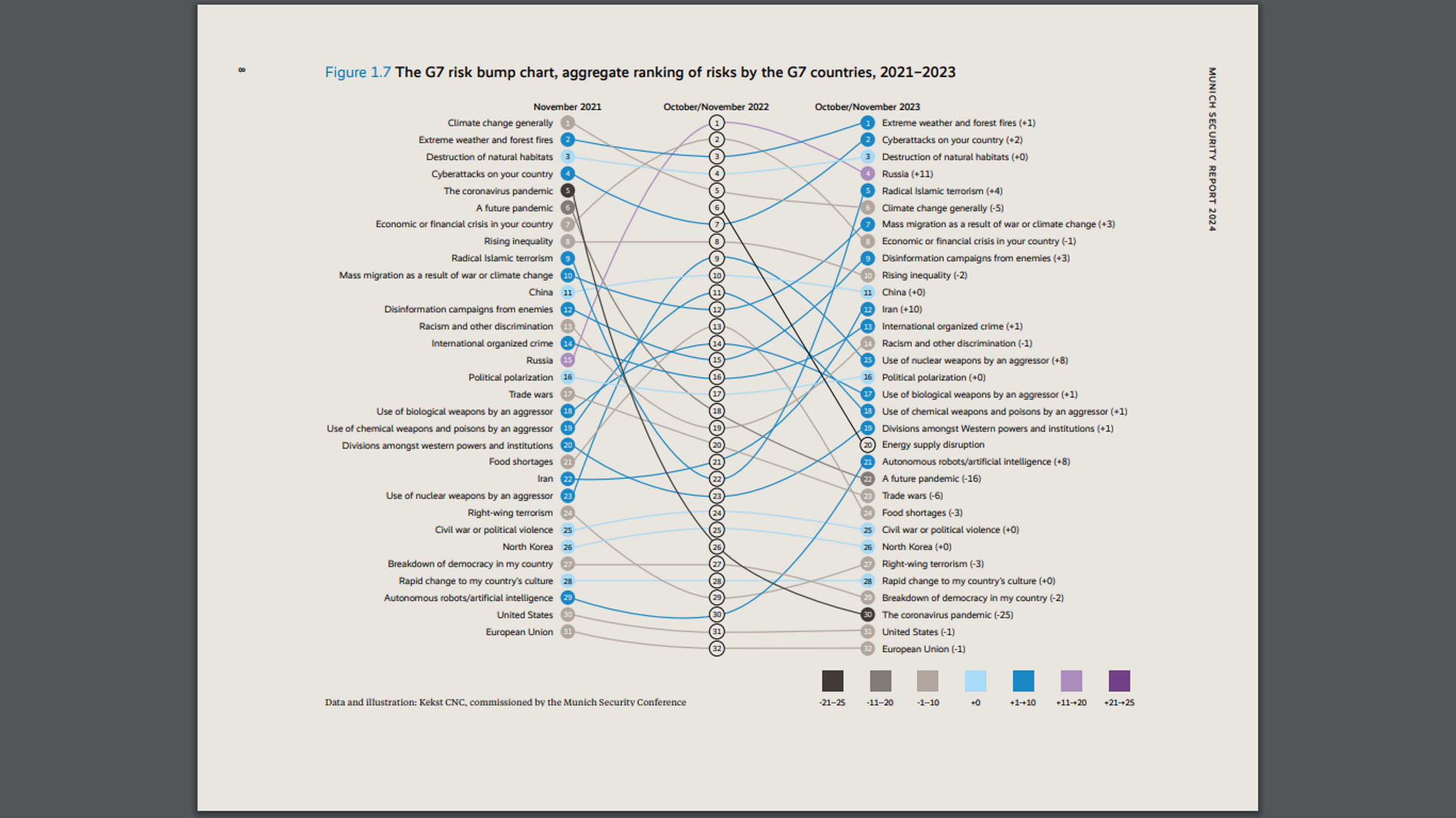
The G7 risk bump chart, aggregate ranking of risks by the G7 countries, 2021-2023
© Photo : MSI
The Munich Security Index 2023
In contrast to the two previous surveys, the 2023 MSI did not poll Russia - citing Moscow's special military in Ukraine.
Thus the study was based on representative samples of 1,000 people from each G7 and BRICS country, except Russia (“BICS”), and Ukraine. The total sample amounted to 12,000 people with polling being conducted from October 19 to November 7, 2022.
"In all countries surveyed bar India, the risk index score for Russia rose significantly," the paper said. "While Russia was not seen as a top five risk in any of the G7 countries only a year ago, citizens in five G7 countries now consider Moscow the number one risk."
Nonetheless, the authors of the survey admitted that differences in risk perceptions between citizens in G7 countries and others are "profound": "Notwithstanding sizable increases in the risk index scores in Brazil, China, and South Africa, Russia ranks fairly low in four BRICS countries."
Meanwhile, G7 countries saw Russia as a number one "threat". Italy, which used to hold a positive view of Russia, ranked the country sixth in its list of major risks, whereas the US, Canada, France, Japan and Germany ranked Russia first with the UK placing it second only to "energy supply disruption."
Eventually, Russia leaped to the first place in the G7 risk bump chart. When it comes to "BICS", Russia went just slightly up from 29th place to 28th.
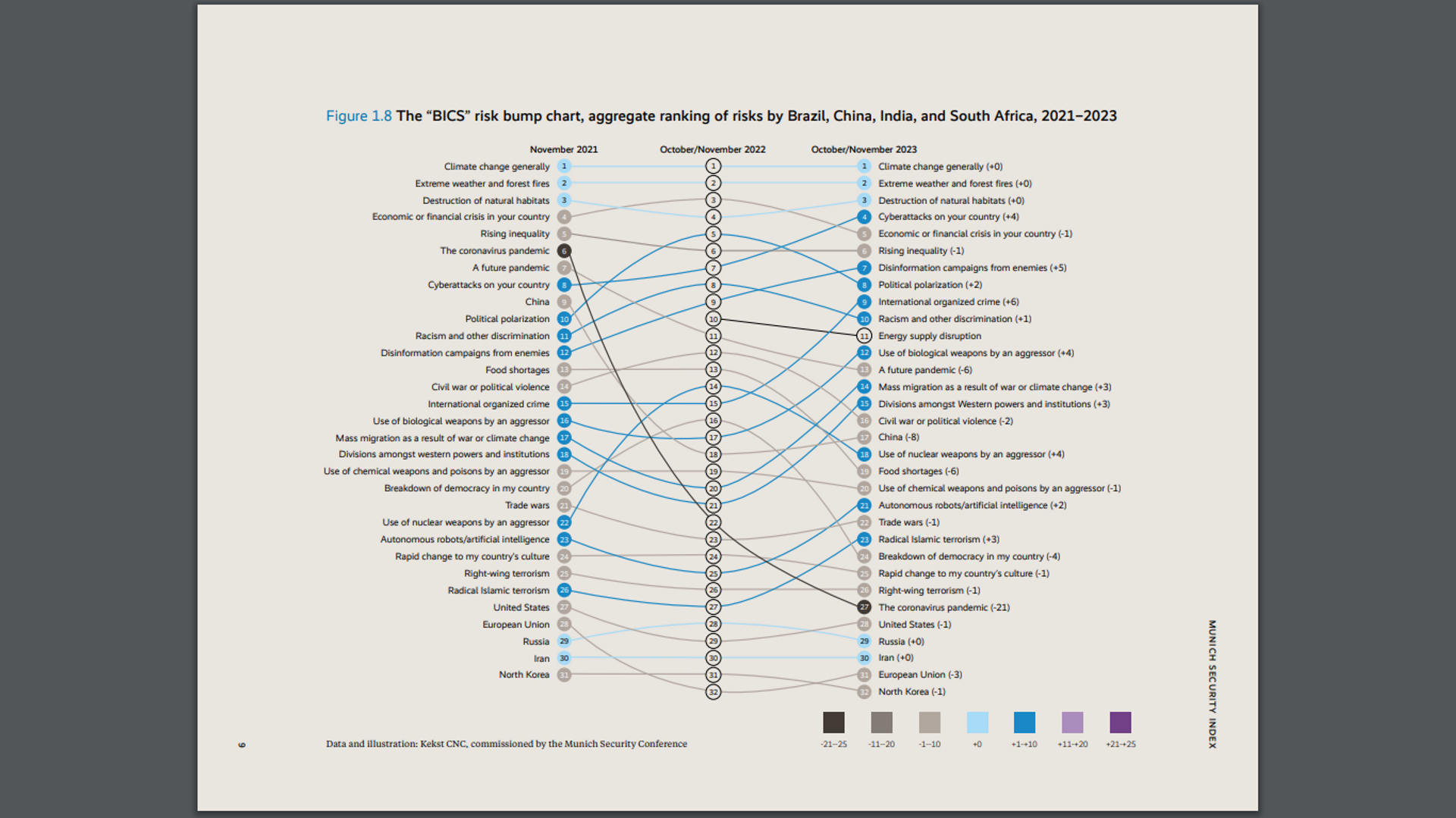
The "BICS" risk bump chart, aggregate ranking of risks by Brazil, China, India, and South Africa, 2021-2023
© Photo : MSI
The Munich Security Index 2024
However, the 2024 MSI saw Russia drop to fourth place in the survey's risk bump chart for G7 industrialized economies, while in the similar chart for "BICS" Russia returned to 29th place.
If one takes a closer look at G7 countries, one would see that Canada ranked Russia third, outlining extreme weather and forest fires and destruction of natural habitats as its top two major risks, respectively.
France ranked Russia sixth: the nation's top five perceived major risks now include: radical Islamic terrorism; mass migration; climate change generally; extreme weather and forest fires; racism and other discrimination.
Germany ranked Russia seventh. The country's top six major risks are mass migration; radical Islamic terrorism; cyberattacks; international organized crime; destruction of natural habitats; and rising inequality.
Italy ranked Russia 12th. The US ranked Russia fourth (seeing cyberattacks, political polarization, and China as greater threats). Only Japan and the UK say that Russia remains the number one threat for them.
The change in perception of Russia among G7 countries – those who spearheaded sanctions against Moscow and have been arming Ukraine throughout the conflict – was admitted by the MSI authors as a "moderation of trends" in the wake of the Russian special military operation. Remarkably, it occurred as Ukraine's counteroffensive failed and Russia saw new successes on the battlefield.
At the same time, the aforementioned "moderation of trends" coincided with Ukraine fatigue among the US public, which – as national polls showed – started to see Washington's supplying of the Kiev regime as "excessive". Likewise, House Republicans put the brakes on President Joe Biden's $60 billion Ukraine package.
Meanwhile, despite approving a $54 billion package to patch the gaps in Ukraine's budget, the EU is seeing steady erosion in support for the Kiev regime among the European public. Moreover, the bloc, as well as the UK, has seen stagnation with Germany suffering from the GDP contraction and de-industrialization.
In addition, Washington and NATO's ungrounded claims that Russia "wouldn't stop" in Ukraine, but would launch an attack on the transatlantic alliance member states apparently haven't resonated with the general Western public.
The interview between US journalist Tucker Carlson and President Vladimir Putin seems to dot the i's and cross the t's on the causes of the Russian special military operation as well as its objectives. As Larry Johnson, a retired CIA intelligence officer and State Department official, told Sputnik following the Carlson-Putin conversation, the interview will further erode the funding crusade for US proxy conflict in Ukraine.
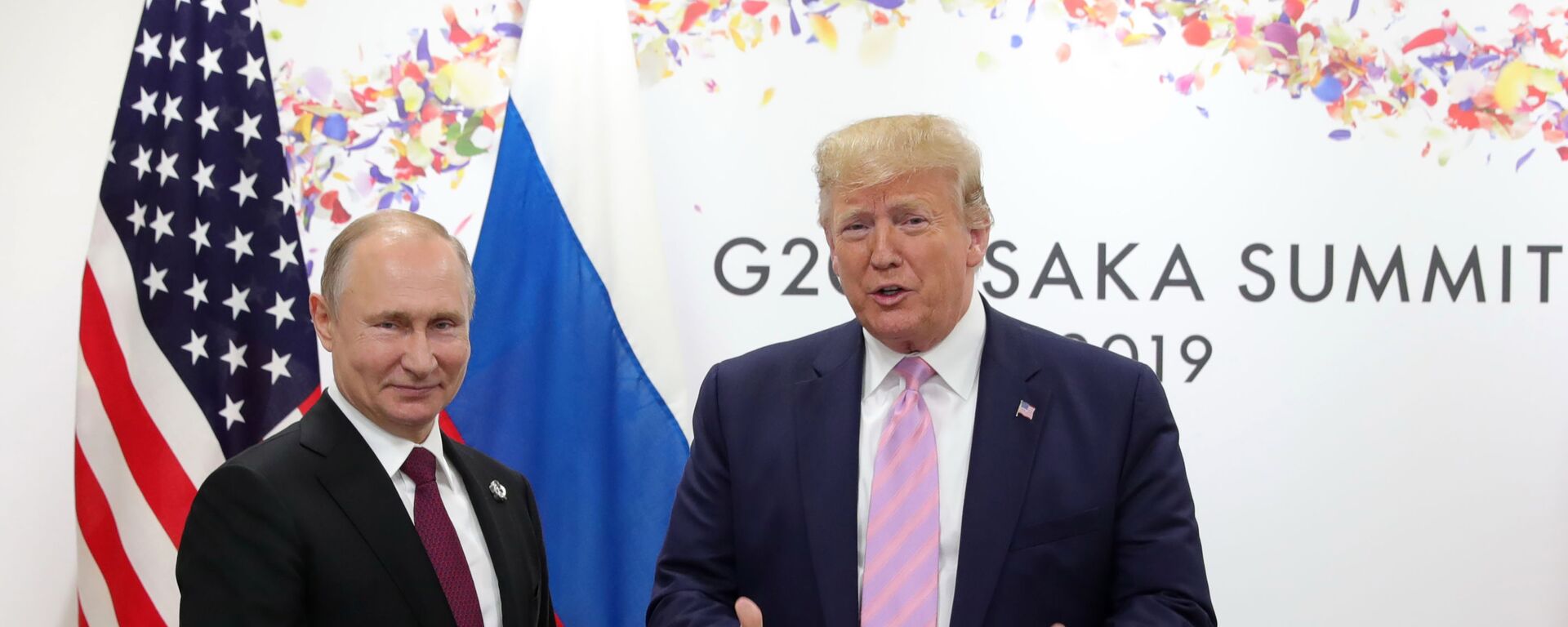
11 February 2024, 18:38 GMT

